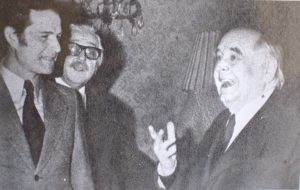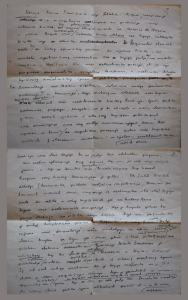M. Krleža – Review of “The Speech of Mikula Trudni” (1945)

Miroslav Krleža (right) with Marin Franičević (behind, on the left) and actor Boris Buzančić at the celebration of the 80th anniversary of Krleža’s birth and the 60th anniversary of his creative work, on December 10, 1973, at the Yugoslav Academy of Sciences and Arts in Zagreb (Jelsa Municipal Museum, Marin Franičević Collection).
The poetry of Marin Franičević is not folklore. His inspirations are linked to numerous elements within the realm of Čakavian lyric poetry. Alongside various experiments—from Ujević to Nazor—within the richness of our contemporary Čakavian verse, this book is not rhetoric. Regional elements here rise to the level of pure poetic rapture, to a model of perfection. This book emerges from the classical soil of our Dalmatian poetic tradition, but from it speaks a programmatic, social tendency in a harmonious blend of literary-artistic expression and political propaganda. These lamentations on the harsh living conditions of our common folk are transformed into a “canzoniere” that masterfully evokes the complete literary-decorative arsenal of our Mediterranean lyricism. Vegetation, people, circumstances, prejudices, paysages, lighting—all come alive in this archaic speech of ancient centuries, although this literary document of our present day carries a deeper meaning. Its “charm” lies precisely in this—that it suggestively connects the pathos of a distant literary past with the social concerns of our own time. The tradition of our old literature appears here as a current issue, as a fortunate realization of a concept that is not always clearly defined in itself, and which is often simplistically labeled as socially tendentious literature…
The scope of this lyrical canzoniere is vast. From pure lyrical fragments—accordions, carnival festivities, spring moods, fireplaces on gloomy winter days, childhood impressions, etc.—the book grows toward a major theme still largely unexplored in our literature: the misery of our overseas emigration, which has lasted from the mid-19th century up to the present day. We do not know of anyone who, after Kranjčević’s poem The Emigrant, has more eloquently sung of our homesickness, our nostalgia for the unfortunate Old Country, for which even today entire generations weep on the distant shores of foreign seas and oceans.
The monologue of Mikula Trudni is a soliloquy which, as a plaidoyer for socially engaged poetry, represents a successful synthesis of lyrical eloquence and sincere, evocative expression.
For all these reasons, we believe this book fully deserves to be published by “M.H.” in its current annual edition.
M. Krleža, 1945.

The original manuscript of Krleža’s review from 1945 (Jelsa Municipal Museum, Marin Franičević Collection).